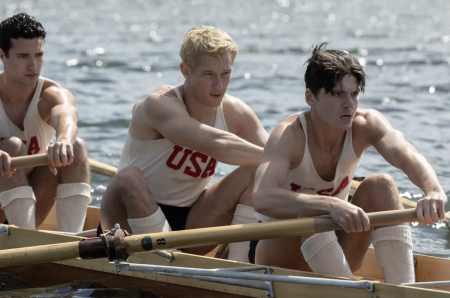'The Boys in the Boat' review: George Clooney's patriotic sports drama honors biblical principles

Every few years, a real-life inspirational sports drama hits the big screen — think "American Underdog," "The Blindside" and "Chariots of Fire" — and reminds audiences of just how extraordinarily resilient humans can be when bolstered by a robust support system and personal ambition.
George Clooney's "The Boys in the Boat" is the latest film in this genre celebrating the values of a past era, specifically, teamwork over individualism and humility over personal ambition.
Releasing in theaters on Christmas Day and starring Joel Edgerton, Callum Turner and Hadley Robinson, "The Boys in the Boat" is based on Daniel James Brown's bestselling book of the same title.
Set against the backdrop of the 1936 Berlin Olympics, the film tells the story of nine University of Washington students who, despite facing immense hardships, unite to pursue an almost unattainable goal — Olympic gold.
At the center of the story is protagonist Joe Rantz (Turner), a lonely yet determined young man struggling in the wake of the Great Depression. Viewers quickly learn his heartbreaking backstory: His father and stepmother abandoned him when he was 14, and he's been on his own ever since. He wants to make something of himself and attend college, but his circumstances are dire. He sleeps in a rusted-out car, stands in line at soup kitchens for his meals and patches the holes in his shoes with newspaper.
Determined to pay for his college courses, Rantz tries out for rowing, a sport typically reserved for society's elite and Harvard and Yale students. If he makes the team, he earns a small income, plus a bed and meal.
Young and physically fit, Rantz is one of nine young men to make the team, coached by no-nonsense coach Al Ulbrickson (Edgerton). Convinced his team is more capable than they believe themselves to be, Ulbrickson makes the ambitious decision to take his young athletes all the way to the Olympics.
Central to the story is the theme of perseverance against all odds: the challenges of rowing aren't just physical, though the film highlights just how grueling the sport can be. A beautifully shot period piece, "The Boys in the Boat" captures the aesthetics of rowing and uses nostalgic cinematography to add a layer of authenticity to the story.
But Rantz struggles with inner turmoil, grappling with his past and deep-seated feelings of inadequacy, which in turn causes him to become out of sync with his teammates. Struggling to align with his team, Rantz is temporarily replaced.
"Listen, I know it isn't easy to trust every other person on that boat as much as you trust yourself. But it's not about you. As good as you are, it's not about you, Joe. Or me, or anybody else. It's about the boat," Ulbrickson tells him in that particularly poignant scene.
He ultimately finds solace and purpose in the camaraderie and discipline of the crew team, but it requires him to give up his lone-wolf mentality and shelf his pride. It's George Pocock (Peter Guinness), a British designer and boat builder who serves as a mentor of sorts to Rantz and reminds the young rower that the sport isn't just about him; it's about the boat.
When the rowers are working in harmony, their "sweat and pain bleed into the grain" of the boat "as they become one magical thing that moves across the water like it was born to be nowhere else," Pocock says. "It's poetry."
The crew finally makes it to the 1936 Berlin Olympics in Germany after besting upper-class Ivy League students and financial woes. In Germany, they face one final obstacle: Nazis, led by a grim Adolf Hitler who wants nothing more than to beat the U.S.
Fortunately, the ending of "The Boys in the Boat" is an uplifting one well-documented by history, a tale of how teamwork, coupled with hard work, can lead a hero down a path of success and self-discovery. The film's climax, the suspenseful final race, concludes with the triumph of faith and unity over adversity.
A sweet subplot in the film is the relationship between Rantz and his future wife, Joyce (Robinson). She encourages him to persevere despite internal and external challenges, breaking down his frosty exterior.
"The Boys in the Boat" is rated PG-13 for language and smoking, including several misuses of God's name.
And though not a faith-based film, "The Boys in the Boat" highlights the biblical principles of faith, perseverance and brotherhood, reminiscent of the sports films of yore. It's a reminder, at a time when the country seems irrevocably divided, to look outside oneself and embrace the power of unity. For sports drama lovers, "The Boys in the Boat" provides a worthwhile viewing experience this holiday season.
"The Boys in the Boat" is distributed by Amazon MGM studios and also stars Luke Slattery, Peter Guiness, Sam Strike, Jack Mulhern, Bruce Herbelin-Earle, Thomas Elms, Joel Phillimore, Tom Varey, Wil Coban and Chris Diamantopoulus.
Leah M. Klett is a reporter for The Christian Post. She can be reached at: [email protected]





















